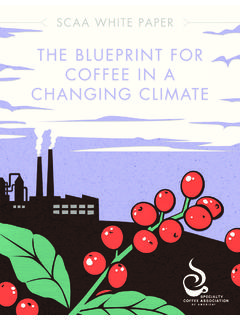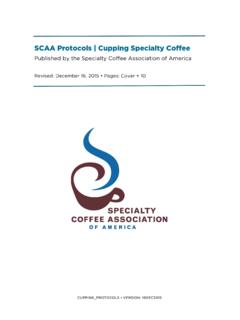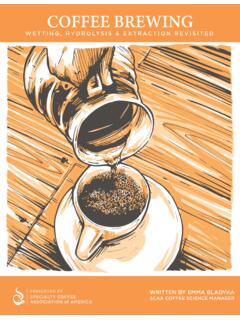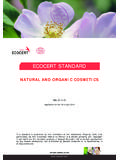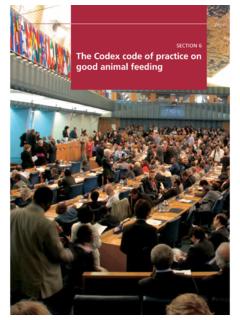Transcription of Sustainable Coffee Certifications Comparison Matrix 2010.d…
1 Sustainable Coffee Certifications A Comparison Matrix Created by the SCAA Sustainability Council (2010) Page 1 Last updated: 10/6/2010 By: Adam Kline Certification / Verification Organic Fair Trade Certified Rainforest Alliance Smithsonian Bird Friendly Utz Certified 4 C Common Code Mission Create a verified Sustainable agriculture system that produces food in harmony with nature, supports biodiversity and enhances soil health. Support a better life for farming families in the developing world through fair prices, access to direct trade, community development and environmental stewardship. Integrate biodiversity conservation, community development, workers rights and productive agricultural practices to ensure comprehensive Sustainable farm management. Conduct research and education around issues of neo-tropical migratory bird populations, promoting certified shade Coffee as a viable supplemental habitat for birds and other organisms. UTZ CERTIFIED s mission is to achieve Sustainable agricultural supply chains, where: Producers are professionals implementing good practices which enable better businesses, livelihoods and environments; The Food industry takes responsibility by demanding and rewarding sustainably grown products; Consumers buy products which meet their standard for social and environmental responsibility.
2 The 4C Association is an inclusive membership driven organization of Coffee farmers, trade and industry and civil society. Members work jointly towards improving economic, social and environmental conditions through more Sustainable and transparent practices for all who make a living in the Coffee sector. Market Focus All markets All markets Global, with special emphasis on N. America, Europe, Japan, and Australia All markets Mainstream and Specialty Mainstream market (ambition: vast majority of Coffee market) History and Development Trace back to 19th century practices formulated in England, India, and the US. First certification 1967. Developed into internationally recognized system with production throughout the world. * The organic Coffee Began as Max Havelaar in the Netherlands in the 1970s. Now the German-based Fairtrade Labelling Organizations International (FLO) collaborates with 19 labeling initiatives, including TransFair USA, and three producer networks Begun in 1992 by Rainforest Alliance and a coalition of Latin American NGOs, the Sustainable Agriculture Network (SAN).
3 First Coffee farm certification in 1996. The Rainforest Alliance Certified TM program requires that farms meet comprehensive Founded in 1997 with criteria based on scientific fieldwork. Operated out of the SMBC office initially, it currently involves 14 organic certification agencies as the managers of the program. Begun in 1997 as initiative from industry and producers in Guatemala; Utz Kapeh became an independent NGO in 2000. First certified farms in 2001. In 2008, Utz Kapeh changed its name to Utz Certified Good Inside to better communicate and encompass more Begun in 2003 as public-private partnership project by the Coffee industry and the German development cooperation to initiate a multi-stakeholder dialogue for defining a mainstream code of conduct for sustainability: The 4C Association was Sustainable Coffee Certifications A Comparison Matrix Created by the SCAA Sustainability Council (2010) Page 2 Last updated: 10/6/2010 By: Adam Kline Certification / Verification Organic Fair Trade Certified Rainforest Alliance Smithsonian Bird Friendly Utz Certified 4 C Common Code sector represented nearly 3 percent of the total green Coffee imports in 2007* representing Latin America, Asia and Africa.
4 TransFair USA has been administering the Fair Trade Certified label since 1998. standards covering all aspects of production, the protection of the environment, and the rights and welfare of farm families and their local communities. diverse agricultural commodities including cocoa, tea, soy, and palm oil. founded as an international membership association in December 2006. Operational in market since Coffee year 07/08 Code Founders Certifiers and farmer groups began organic certification process around 1967.* The first Fair Trade codes grew out of Solidaridad movement in The Netherlands. FLO, the Rainforest Alliance and SAN, Social Accountability International and IFOAM worked together to improve social standards and auditing practices 1980s farm-based research by SAN scientists and farmers, field-testing, and involvement of all relevant stakeholders. Scientific studies in southern Mexico, Guatemala and Peru during the 1990s. Recent studies in Ecuador, Mexico and Sumatra support the criteria as being highly protective of biodiversity and providing refuge for biodiversity.
5 Continuous Improvement Program for farm and processing applications. Field-based adaptation of Global Gap standard. plus ILO Labor standards. Multistakeholder adaptation of existing codes which resulted in a baseline Code of Conduct, Rules of Participation for Trade and Industry members, a Verification System, Support Services and a participatory democratic governance structure for decision making. Scope of the Program Organic Farming and processing practices. Economic and environmental sustainability for farmers and their communities. Minimum price and social premium to cover costs of production and community-elected development programs. Organic premium for organic coffees. The model empowers small-farmers organized into democratically-run cooperatives to Sustainable farm management in most holistic sense social, environmental, economic and ethical improvements are the cornerstones of the program. Certification aimed at the production area of the Coffee agroecosystem. (Future development of program may address the landscape mosaic as well.)
6 Sustainability: Economic performance through productivity and farm professionalism; environmental standards to preserve wildlife and soils; Worker Health and Safety, prohibiting child labor and insuring access to schools, clean water, housing. Web-based traceability systems, with on line links to producers. Exclude worst practices and continuously increase the sustainability of Coffee production and processing in the economic, social and environmental dimension. Sustainable Coffee Certifications A Comparison Matrix Created by the SCAA Sustainability Council (2010) Page 3 Last updated: 10/6/2010 By: Adam Kline Certification / Verification Organic Fair Trade Certified Rainforest Alliance Smithsonian Bird Friendly Utz Certified 4 C Common Code compete on a global scale. Code Elements for Coffee Production Environmental, farm production and processing standards. Social, economic, environmental, democratic organization of cooperatives. The Rainforest Alliance CertifiedTM program is based on the fundamental principles of Sustainable agriculture including: best management practices; conservation of natural resources, ecosystems and wildlife; workers rights and benefits; and benefits to local communities.
7 Biophysical criteria of the shade component, provided that the farm is certified organic. Socially, environmentally, and economically conscious growing standards. Food safety and Quality elements. Economic, social and environmental dimension Scope of the Code Federal standard with practices for producers and handlers applies to all organic product sold in US. Similar but unique standards are applied internationally. Baseline and rogress criteria. Continuous improvement required through Progress Requirements. Applies to democratically organized cooperatives formed by small-scale farmers. More than 200 criteria (checkpoints); Field-tested indicators. Applies to farms and coops of all sizes. Continuous improvement required. Organic certification as a condition for BF certification. Certification applicable to estate farms and cooperatives. Inspection done at same time as organic inspection, but only every three years. Baseline criteria with field-tested indicators and independent, third-party auditing.
8 Applies to farms and coops of all sizes. All countries possible. Continuous improvement required. 10 Unacceptable Practices and 28 Baseline principles with 84criteria according to the traffic-light-system (red, yellow, green practices); Participation possible with minimum average yellow in each dimension of sustainability, continuous improvement towards green practices required. Applies to farms and to production structures of all sizes. Minimum capacity of 4C Unit = Sustainable Coffee Certifications A Comparison Matrix Created by the SCAA Sustainability Council (2010) Page 4 Last updated: 10/6/2010 By: Adam Kline Certification / Verification Organic Fair Trade Certified Rainforest Alliance Smithsonian Bird Friendly Utz Certified 4 C Common Code 1 container of green Coffee . Every country. Stepping stone function to provide easier access to certification/marketing schemes for producers. Technical Assistance and Capacity Building Part of many certifiers role. Organic research federally and privately funded by non-profits and NGOs.
9 SCAN perhaps the most well-known Technical Assistance and Capacity provider network for all systems, not just organic. Provided by TransFair USA for specific grant-funded projects and by FLO (Fair Trade Labelling Organizations International) worldwide through its Producer Business Unit. FLO Liaison officers located in most of the countries to support producer organizations. (Technical assistance and audits are kept separate.) Provided by local NGO partners ( Sustainable Agriculture Network), extensionists trained by the program, and by collaborating institutions. (TA and auditing are kept separate.) Continual provision of training workshops to organic inspectors, NGO staff, cooperative technicians, grower groups and government representatives. Provided by the program at very low cost to producers, in alliance with Solidaridad (CSN). Technical assistance providers are trained by Utz Certified and are available world-wide. Support to 4C Units, members and other interested stakeholders through training-of-trainer workshops, access to tools & manuals through the 4C Tool Library; project facilitation; regional stakeholder meetings and sustainability fora; trainings and tool development through in-kind-contribution by 4C Members; cooperation with other national and international organizations and between members of the 4C Association.
10 Regional Offices in mayor Coffee regions. Inspection Frequency and Accreditation Annual inspections for certified entities. USDA accreditation required for certifiers of organic product sold in US. Annual inspections by independent and annually trained Fair Trade inspectors. Audits are conducted on an annual basis by trained auditors including teams of biologists, agronomists, sociologists and other Every three years, linked to organic inspection. Inspection/certification arranged/provided by a USDA-accredited organic certification Independent auditors accredited to ISO 65 standard. 10 % shadow/surprise audits. Audits done annually of farm and roasters (if logo used). Independent third-party auditors accredited to ISO 65 standards and trained by 4C. Free tri-annual Sustainable Coffee Certifications A Comparison Matrix Created by the SCAA Sustainability Council (2010) Page 5 Last updated: 10/6/2010 By: Adam Kline Certification / Verification Organic Fair Trade Certified Rainforest Alliance Smithsonian Bird Friendly Utz Certified 4 C Common Code specialists whose knowledge and capacity to conduct audits is authorized and monitored by the Sustainable Agriculture Network.

